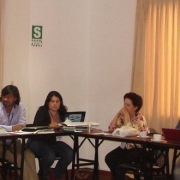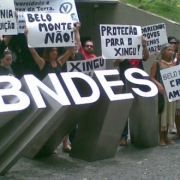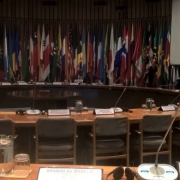Binding Treaty on Business and Human Rights: Comments from Fundeps and the new revised Draf
At the fourth session of the United Nations Intergovernmental Working Group on Business and Human Rights, different actors presented their comments and proposals on the ‘zero’ draft of the legally binding international instrument. Fundeps made recommendations and questions about certain axes of the draft, relevant to guarantee the fulfillment of human rights by transnational companies. Based on the comments made, on July 17, the Intergovernmental Working Group presented the new Revised Draft.
“Below, we offer a google translate version of the original article in Spanish. This translation may not be accurate but serves as a general presentation of the article. For more accurate information, please switch to the Spanish version of the website. In addition, feel free to directly contact in English the person mentioned at the bottom of this article with regards to this topic”.
In 2014, the UN Human Rights Council issued two resolutions, one of which ordered the establishment of an intergovernmental working group responsible for developing a binding treaty on business and human rights. The second resolution, of the same year, requested the UN working group to prepare a report containing the benefits and limitations of legally binding instruments.
From there, the work group sessions began. The first one was held in 2016 and the second in 2017, where Ecuador presented the document ‘Elements for the Legally Binding International Instrument Project on Transnational Corporations and other companies with respect to Human Rights’. In these sessions, the intergovernmental working group focused on improving the content, scope, nature and form of the potential international instrument to regulate the activities of transnational corporations and other companies in the fulfillment and respect of human rights.
In the third session, in 2018, the working group published the Zero Zero Draft ’of the Binding Treaty; The elements for preparing a draft of a legally binding instrument were discussed taking into account the discussions held in the first two sessions.
Last year, in the fourth session, calls for comments and proposals were made on the draft of the binding treaty. The presentations were made by some States such as Chile, Colombia and the Philippines, non-governmental organizations with consultative status and other stakeholders such as civil society organizations, including Fundeps. The document on the ‘zero’ draft, presented by the foundation, is divided into general and specific comments.
The general comments made by Fundeps cover different aspects that have not been taken into account in the document and that are extremely relevant to ensure that transnational corporations guarantee and respect human rights. Among the comments, the absence in the Treaty of commercial activities that are supported by the States, the high relevance given to the remedy of damages and rights of the victims that, although it is extremely positive, are even more necessary a priori are measures prevention to prevent companies from violating human rights. With prevention there would be no need to remedy any damage caused since these would not exist if they were well regulated.
On the other hand, the draft Treaty only establishes a binding component for the States, but companies are not given responsibility. Therefore, not only does it not make them obliged subjects, which was the initial idea, but they will respond before the laws that the States implement in this matter. In addition, the creation of a court or other institution that has the capacity to judge and penalize the actions of transnational corporations is absent.
Finally, in the general comments of Fundeps, the absence of the sections on ‘corporate obligations’, ‘state obligations’ and the obligations of international organizations, which are fundamental elements to guarantee the fulfillment of rights, is highlighted Humans versus business activity.
Specific comments were made in accordance with the sections of the draft. According to the preamble, it is recommended to include the relationship with other international conventions and recognize ‘Corporate Capture’ as a global issue that undermines human rights. In addition, the absence of guiding principles on business and human rights as an immediate precedent of the treaty is questioned. , as well as the lack of recognition of the danger situation of human rights defenders. Regarding the purpose of the Treaty, it is recommended that the purpose of the document should be the guarantee of human rights and incorporate as an objective of the addressed the resolution of power imbalances between corporations and affected communities.
Finally, in Prevention, the componente Gender ’and conflict of interest component should be incorporated into all due diligence measures. In addition, these measures must ensure transparency in the interactions of transnational corporations with state authorities, and the protection of human rights defenders through specific and reinforced protection mechanisms.
New Draft: progress?
The Intergovernmental Working Group, in charge of drafting the document, has made progress in its development. Consequently, on July 17 they presented the Revised Draft of the binding treaty to regulate the activities of transnational corporations and other commercial companies regarding human rights. This version was made according to the recommendations and comments proposed by the different actors convened in the fourth session last year. This draft will be discussed in the fifth session, which will take place between October 14 and 18 of this year.
At first glance, the new draft of the binding treaty has modified the formulation, which, in the words of Hood and Hughes-Jennett, is rather ambiguous. Thus, in Article 3 of the draft, its application has been extended to “all commercial activities”, that is, it will no longer be limited to those of a transnational nature. However, the definition developed in Article 1 on commercial activities leaves those that are purely national in scope of the treaty. A positive development in the project has been the elimination of the requirement that commercial activity should be limited to all those that were carried out “for profit”.
On the other hand, the new Article 6 of the draft treaty incorporates a new provision where States will have responsibility for not preventing damage that the party with whom they have a contractual relationship has caused third parties, regardless of where the damage occurs ( Hood & Hughes-Jennett, 2019).
From the perspective of due diligence, an improvement in the draft has been observed, since the States are not only obliged to regulate commercial companies within their territory where they are obliged to respect and prevent violations of DD.HH .; now in the project it is clarified that the legislation must be introduced to make the due diligence of human rights mandatory and, in addition, companies must be obliged to acquire the appropriate measures to prevent violations or abuses of human rights. It represents a breakthrough because it means a convergence with the UN Guiding Principles (Hood & Hughes-Jennett, 2019).
With regard to legal-criminal liability, the Revised Draft has eliminated the provision on universal jurisdiction and instead has incorporated a new provision that establishes the jurisdiction of territorial, active and passive nationality. Therefore, the states will be disabled to exercise jurisdiction in those behaviors that do not constitute a criminal offense, in accordance with international law in situations where there is no conventional jurisdictional link with the crime (Hood & Hughes-Jennett, 2019) .
Consequently, we must wait and observe the decisions that occur in the fifth session on the Revised Draft. While the incorporation of some recommendations and a closeness to the Guiding Principles on business and human rights is observed, there is still a shortening of distances between the Revised Draft and the Guiding Principles; since these have been the initial kick representing a fundamental advance in the normative criteria on the responsibility and the accountability of the transnational companies. There are still issues that are not clearly defined in the revised draft, which means that transnational corporations continue without being fully obliged to respect and guarantee Human Rights.
Más información:
- Presentamos comentarios al borrador del tratado de empresas y derechos humanos – Fundeps
- Avanzamos hacia tratado vinculante de empresas transnacionales y derechos humanos – Fundeps
- Tratado Vinculante.– Business & Human Rights Resource Centre.
- Comentarios y propuestas para el borrador ‘zero’ de instrumento internacional jurídicamente vinculante sobre empresas transnacionales con respecto a los derechos humanos – Fundeps
- UN Working Group publishes revised draft of business and human rights treaty: commentary on scope, prevention and legal liability. – JDSUPRA – Hood, P. & Hughes-Jennett, J. (2019).
- Fourth sesión of the open-ended intergovernmental working group on transnational corporations and other business enterprises with respect to human rights – United Nations Human Rights Council.
- Legally binding instrument to regulate, in international Human Rights Law, the activities of transnational corporation and other business enterprises – United Nation Human Rights Council (2019).
Authors
Sofia Brocanelli
Contact
Gonzalo Roza gon.roza@fundeps.org





